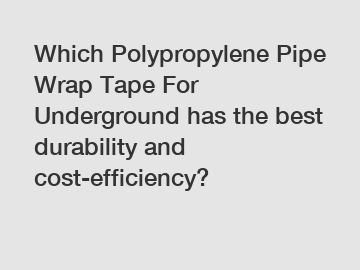When it comes to protecting underground pipes from corrosion and damage, the choice of pipe wrap tape is crucial. Among various options available, polypropylene pipe wrap tapes have gained immense popularity due to their exceptional durability and cost-efficiency. In this blog, we will explore different types of polypropylene pipe wrap tapes and determine which one offers the best combination of durability and cost-efficiency.
1. Understanding Polypropylene Pipe Wrap Tapes.
Polypropylene (PP) pipe wrap tapes are specifically designed to withstand the harsh underground environment and protect pipes from corrosion. They are commonly used for pipes made of steel, iron, and other metals susceptible to degradation. Let's delve into the different types of PP pipe wrap tapes available:

1.1 Plain Polypropylene Tape.
Plain PP tape is the basic form of pipe wrap tape. It provides moderate protection against corrosion and is an economical solution for less demanding applications. Its durability might vary depending on the thickness and quality of the tape used.
1.2 Reinforced Polypropylene Tape.
Reinforced PP tape is strengthened with extra layers such as fiberglass or polyester mesh. This significantly enhances its durability and resistance to damage from impacts, abrasion, and UV radiation. Reinforced tapes offer a higher level of protection and are more suitable for high-pressure systems or pipes located in challenging environments.
1.3 Self-Adhesive Polypropylene Tape.
Self-adhesive PP tape is coated with a durable adhesive on one side, making it easy to apply without the need for additional adhesives or primers. It forms a strong bond with the pipe's surface, effectively preventing water infiltration and protecting against corrosion.
2. Factors Influencing Durability.
To determine the durability of a polypropylene pipe wrap tape, several factors need to be considered:
2.1 Thickness and Width.
Thicker and wider tapes generally provide better protection as they offer increased mechanical strength and resist damage from external factors. However, they may be costlier than thinner options.
2.2 Adhesive Strength.
The adhesive quality determines how well the tape adheres to the pipe surface. Strong adhesion prevents water penetration and ensures long-term protection against corrosion.
2.3 UV Resistance.
Polypropylene tape exposed to sunlight should have good UV resistance to prevent degradation and maintain its durability over time. UV-resistant tapes are essential, particularly for pipes located above ground.
2.4 Chemical Compatibility.
The tape should be resistant to chemicals commonly found in the soil or surrounding environment. This ensures that it remains intact and functional even in chemically aggressive conditions.
3. Assessing Cost-Efficiency.
While durability is essential, cost-efficiency also plays a significant role in choosing the right polypropylene pipe wrap tape. Consider the following aspects when evaluating the tape's cost-effectiveness:
3.1 Longevity.
A tape that offers long-term performance at a reasonable cost is considered highly cost-efficient. Investing in a durable tape will save money by reducing replacement and maintenance expenses.
3.2 Installation Ease.
Tapes that are easy to install can save time and minimize labor costs. Self-adhesive PP tapes, for instance, eliminate the need for additional adhesive products and simplify the overall installation process.
3.3 Maintenance Requirements.
Tapes that require minimal upkeep contribute to overall cost-effectiveness. Choosing a tape that is resistant to damage and requires fewer repairs or replacements will reduce long-term expenses.
Conclusion.
Choosing the right polypropylene pipe wrap tape involves assessing both durability and cost-effectiveness. Considering factors such as thickness, adhesive strength, UV resistance, and chemical compatibility can help determine the tape's durability. Additionally, factors like longevity, installation ease, and maintenance requirements influence cost-effectiveness.
While there are various options available, reinforced polypropylene tapes, combining strength, resistance, and cost-effectiveness, often emerge as the best choice for long-term underground pipe protection. However, the specific application and environmental factors should always be carefully considered before making a final decision.
Remember, investing in a high-quality, durable, and cost-efficient polypropylene pipe wrap tape is a prudent choice to ensure the longevity and integrity of underground pipes.
Want more information on pipeline Liquid Primer, Pipeline inner wrap tape, visco-elastic tape? Feel free to contact us.



Comments
Please Join Us to post.
0